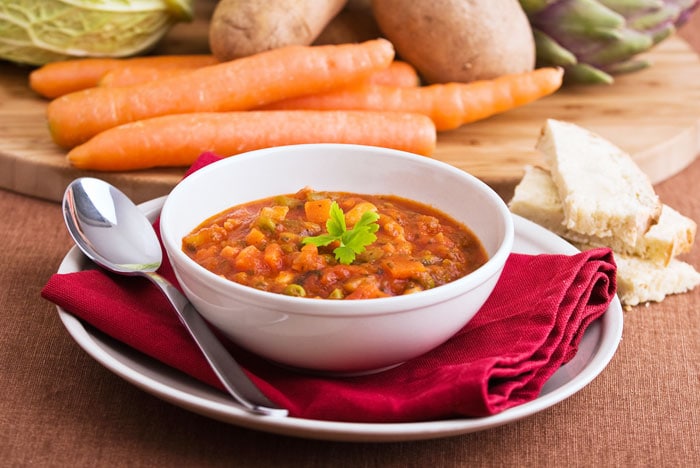
Written By: Gloria Tsang, RD
Title: Founding Registered Dietitian
Alumni: University of British Columbia
Last Updated on:

When winter days are cold, and you want to warm up fast, a bowl of cream soup or stew can certainly be appealing. But there is no excuse to throw all your healthy eating habits out the window just because it’s dark and cold outside!

Table of Contents
Listen to your cravings – there is a reason for them! In the winter, with fewer sunny hours, your stored serotonin (the “feel-good” brain chemical) starts to decline. Your cravings for carbohydrate-loaded comfort foods are your body’s cries for more serotonin. But be careful when choosing carbohydrates to boost serotonin! Opt for nutritious whole grains and choose high-quality carbs such as sweet potatoes, pumpkins, and winter squashes.
Winter produce may not be as exciting and colorful as summer berries, but there are still many healthy choices available. Work seasonal produce such as pomegranates, cranberries, citrus fruits, purple grapes, and orange root vegetables into your meals. You’ll not only add color to your plate, you’ll pack in some serious nutrition punch. Check out our top 15 winter produce post.
If you live in the northern hemisphere or wear sunscreen all the time, consider taking Vitamin D supplements especially in the winter months. Numerous studies have shown that oral intake of 1000 IU Vitamin D can reduce the risk of colon, breast, and ovarian cancers by as much as 50 percent. Vitamin D can be found in fortified dairy products, fatty fish, and egg yolks. But reaching the recommended level through food alone is rather difficult. Therefore, the Canadian Cancer Society recommends that all adults take 1000 IU of Vitamin D supplements every day during the fall and winter seasons. Be sure to speak to your doctor before starting any supplementation and check your existing multi-vitamins for the amount of Vitamin D you are currently supplementing.
Despite numerous claims you may have heard, no diet remedy or supplement has scientifically proved effective at preventing cold and flu, except Vitamin D. A 2007 study found that participants taking daily Vitamin D supplements were 3 times less likely to report cold and flu symptoms. What about Vitamin C? Studies have shown that 1,000 mg of Vitamin C supplements may make your cold milder and shorten it by half a day. In addition, there’s a promising perk for yogurt lovers! A German study found that probiotics (as found in yogurt with active culture) may shorten your cold episode by almost two days. So keep on eating those “friendly” bugs!
Alumni: University of British Columbia – Gloria Tsang is the author of 6 books and the founder of HealthCastle.com, the largest online nutrition network run by registered dietitians. Her work has appeared in major national publications, and she is a regularly featured nutrition expert for media outlets across the country. The Huffington Post named her one of its Top 20 Nutrition Experts on Twitter. Gloria’s articles have appeared on various media such as Reuters, NBC & ABC affiliates, The Chicago Sun-Times, Reader’s Digest Canada, iVillage and USA Today.
lose that weight, vitamin d, whole grains, winter